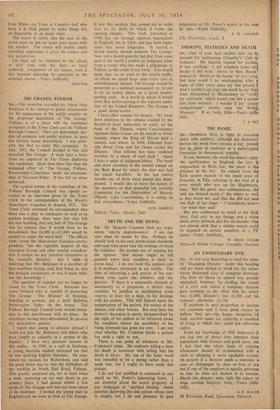TRUTH AND THE DYING StR,—Mr. Maurice Cranston finds my argu-
ments utterly unprofessional.' I am not sure what he means by this. Perhaps he should look to his own professional standards and read with more care the writings of those he criticises. He accuses me of arguing for the opinion ' that nurses ought to tell patients when their condition is likely to prove fatal.' I do not hold this opinion and it is nowhere advocated in my article. The duty of informing a sick person of his con- dition rests upon the relatives and the doctors. If there is a reasonable element of uncertainty in a prognosis, a doctor may certainly be justified in maintaining some reserve, at least for a time, in his dealings with his patient, This will depend upon the temperament of the patient, the nature of the disease, and other factors. But even here the doctor's discretion is surely circumscribed by the right of the patient to be informed about his condition before the possibility of his being informed has gone for ever. I am not clear whether Mr. Cranston thinks a patient has such a right or not.
There is one point of substance in Mr.
Cranston's letter, He contrasts telling a man his death is imminent with telling him his death is likely. My use of the latter word was intended to be a strong rather than a weak one, but I ought to have made this plainer.
I do not feel qualified to comment in any detail on Mr. Power's interesting letter. I judgement on Mr. Power's action in the case he cites.—Yours faithfully, The University, Leeds, 2
I. M. CAMERON


































 Previous page
Previous page